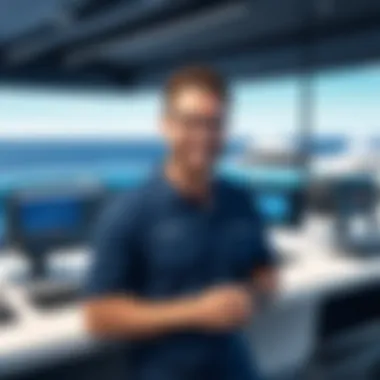Marina Software Solutions: Enhancing Marine Efficiency


Intro
In the marine industry, efficiency and organization are paramount. Marina software solutions aim to streamline operations for marina operators while enhancing the experience of boat owners. These solutions encapsulate a range of functionalities that respond to the unique challenges of managing marinas. With the rise of digital technology, the need for robust software systems has never been more apparent. This article examines the various aspects of marina software, emphasizing its key features and the benefits it provides to users.
Functionality
Overview of key features
Marina software includes a variety of features intended to optimize daily operations. Common functions include:
- Reservation management: Enables easy booking and scheduling of docks and amenities. This reduces scheduling conflicts and improves client satisfaction.
- Billing and invoicing: Streamlines financial transactions, ensuring accurate billing and timely payments. It allows for easier tracking of revenues and expenditures.
- Customer Relationship Management (CRM): Helps marinas maintain detailed records of client interactions, preferences, and history. This information is crucial for enhancing customer service.
- Inventory management: Focuses on monitoring the inventory of supplies and equipment. Proper management prevents shortages or overstocking.
- Reporting and analytics: Offers insights into operational performance through data-driven reports. This allows for better decision-making and strategic planning.
Each feature is designed with user experience in mind. The software should be intuitive and easy to navigate, minimizing the learning curve for marina staff.
How well the software meets user needs
Technological advancements play a crucial role in meeting the diverse needs of marina operators and their clientele. Various software solutions are tailored to address specific requirements. For instance, solutions like Dockwa, rantrac, and Marina Office can cater to differing operational scales, making them suitable for small local marinas as well as larger, more complex facilities.
User feedback is vital in evaluating effectiveness. Many users report improved operational efficiency and enhanced customer experiences. By comparison to traditional methods, marina software provides a significant upgrade in functionality and user-friendliness. Various options allow users to customize the software to fit their unique processes. Users appreciate the accessibility of these systems, which can often be accessed via mobile devices, adding flexibility and convenience to marina management.
Scalability
Adaptability for growth
One of the vital aspects of marina software solutions is their scalability. As a marina grows, so do its operational needs. Effective software can adapt accordingly, allowing for seamless expansion without disrupting existing processes.
Options for additional features or modules
Many marina software products provide options for additional features or modules. This flexibility ensures that marinas can scale their operations while adding only what is necessary. For instance, if a marina decides to offer more services, it can incorporate new modules for restaurant management or fuel sales seamlessly. Such adaptability ensures that capabilities evolve in sync with the business, ultimately supporting sustained growth and efficiency.
"The adoption of effective marina software solutions is not just a trend; it's a strategic move toward optimized operations in an increasingly competitive marine sector."
As the marine industry continues to embrace technology, understanding the functional and scalable aspects of marina software can lead professionals to make informed decisions when integrating these solutions into their operations.
Understanding Marina Software Solutions
Marina software solutions play a fundamental role in the maritime sector, addressing the specific needs of marina operators and enhancing overall operational efficiency. As the marine industry evolves, the integration of advanced software technologies has become crucial. These solutions facilitate various aspects of marina management, from customer service to financial administration, ultimately supporting decision-making processes based on data-driven insights.
Definition and Purpose
Marina software solutions are specialized applications designed to assist in running marinas and related facilities. Their core purpose is to streamline operations and improve customer satisfaction. They enable marina managers to handle bookings, manage maintenance schedules, track finances, and maintain effective customer relationships. The software serves as a central hub for information, making it easier for operators to make informed decisions. The result is a more organized, efficient, and responsive environment for both the operators and the customers.
Key Players in the Market
The market for marina software is diverse, with several prominent players who have established themselves as leaders. Some of the notable companies include:
- DockMaster: Known for its robust features, DockMaster caters to large marinas and chains, offering extensive management capabilities.
- SmartMarina: This provider focuses on user-friendly software solutions that enhance booking and customer connections.
- Sunset Marina Technology: A newer entrant, Sunset focuses on integrating IoT technologies with traditional marina management.
These companies continually innovate their products, ensuring they meet the needs of modern marina operations.
Historical Context and Evolution
Historically, marina management relied on manual processes, with operators using paper logs and spreadsheets. This approach was labor-intensive and prone to errors. However, with advancements in technology, the 1990s saw the introduction of digital solutions. Initially, these systems were basic, primarily focusing on reservations and billing. Over the years, the evolution of technology has resulted in more sophisticated solutions that incorporate various features such as CRM tools, inventory management, and automated billing systems. Today, the landscape is marked by comprehensive software solutions that utilize cloud technology, enabling remote access and enhanced data analysis.
"Understanding the evolution of marina software solutions is crucial in recognizing their potential in transforming operations and customer interactions."
In summary, understanding marina software solutions is integral to grasping how technology can optimize operations in the marine industry. It highlights the shift from traditional methods to innovative digital solutions that meet the industry’s growing demands.


Core Features of Marina Software
Understanding the core features of marina software is essential for operators and stakeholders in the marine industry. These features facilitate various operations, making it easier to manage resources, enhance customer service, and improve overall efficiency. Each feature plays a specialized role in optimizing marina management, allowing for better decision-making and streamlined operations.
Reservation and Booking Management
This feature is critical for managing customer reservations and bookings effectively. A robust reservation system tracks availability in real-time, ensuring that potential clients can see the current status of slips and facilities. Automated confirmation and reminder notifications reduce no-shows and last-minute cancellations, leading to improved revenue management. Additionally, this system simplifies the process of tracking bookings, making it easier to manage fluctuations in demand throughout the year.
Customer Relationship Management (CRM)
CRM systems within marina software enhance the way businesses interact with their clients. Properly implemented, these systems can provide insights into customer preferences and behaviors. Organizations can tailor marketing efforts based on historical data resulting in personalized service that strengthens customer loyalty. Furthermore, these systems allow for efficient tracking of communication with customers, ensuring all interactions are logged and easily searchable.
Billing and Accounting Systems
Billing and accounting functions are vital for maintaining financial stability in any marina. Properly integrated systems allow for automatic invoicing, payment processing, and financial reporting. This not only saves time but also minimizes errors that can arise from manual processes. Many marina software solutions come equipped with tools designed to generate financial statements, which provide valuable insights into profitability, cash flow, and expenses.
Maintenance Scheduling and Tracking
Effective maintenance scheduling reduces downtime in marina operations. A dedicated feature for maintenance tracking allows managers to create schedules for routine upkeep and urgent repairs. Notifications can be generated for maintenance tasks due, enhancing operational reliability. This not only ensures that all facilities remain in optimal condition but also prevents costly repairs that can result from neglect.
Inventory Management
Finally, inventory management is crucial to prevent stockouts and overstock situations which can affect service delivery. Marion software solutions often include tools for tracking inventory levels, usage rates, and reorder points. By maintaining an accurate inventory, marinas can manage resources more efficiently and optimize operational costs. Furthermore, these systems often allow for integration with sales data to forecast inventory needs more accurately.
Proper utilization of these core features can dramatically elevate the efficiency of marina operations and enhance the overall customer experience.
Benefits of Implementing Marina Software Solutions
Implementing marina software solutions provides multiple advantages that are crucial for enhancing operational efficiency within the marine industry. This section outlines the benefits that operators, boat owners, and customers experience through the effective deployment of such software. Emphasizing improved efficiency, customer experience, data insights, and growth potential, these benefits showcase how technology can transform marine operations.
Improved Operational Efficiency
Marina management involves numerous tasks, including booking reservations, tracking inventory, and maintaining schedules. These activities can become overwhelming without a streamlined system. Marina software solutions enable operators to automate time-consuming processes. For instance, online booking systems significantly reduce the time spent on manual reservations. This allows staff to focus on more critical tasks, ultimately improving team productivity.
By centralizing operations into one cohesive platform, details such as dock occupancy and service availability become clearly visible. This visibility minimizes downtime and miscommunication. Furthermore, a focus on operational details allows managers to anticipate maintenance needs before issues arise, ensuring smooth operations.
Enhanced Customer Experience
In an industry centered around service, customer experience is paramount. Marina software solutions play a key role in enhancing this experience by providing customers with easy access to services and information. User-friendly interfaces allow boat owners to view available services, make reservations, and communicate with marina staff effortlessly.
Additionally, providing options for personalized services fosters positive relationships with customers. For example, regular clients can receive customized notifications on maintenance or special offers, making them feel valued. Feedback mechanisms integrated into the software can also provide valuable insights directly from customers, allowing marinas to adjust services to better meet their needs.
Data-Driven Decision Making
Data is a powerful tool in the marine industry. Marina software solutions generate useful reports and analytics that facilitate informed decision-making. By analyzing trends such as peak booking periods or resource usage, managers can make strategic adjustments to their operations.
These insights assist in identifying areas for improvement, such as staffing needs or service offerings. By leveraging data, marinas can optimize performance and respond more adeptly to market changes. This data-centric approach can also enhance marketing strategies tailored to specific customer demographics, enabling more directed campaigns.
Scalability and Adaptability
As the marine industry evolves, the tools supporting it must also adapt. Marina software solutions provide scalability that wil support ideas for expansion or adaptation based on demand. For smaller marinas anticipating growth, these solutions allow them to easily enhance functionalities without overhauling existing systems.
Adaptability is equally important. The marine industry can be affected by seasonal changes in customer demand or shifts in market dynamics. Marina software can offer timely updates and customization options that keep operations relevant. For instance, implementing seasonal promotions or adjusting services based on customer feedback ensures that the marina stays competitive and responsive to its clientele.
"In a highly competitive environment, continuous improvement is not optional. Marina software solutions empower businesses to strive for better service through innovation and data insights."
By understanding and utilizing these benefits, marina operators can significantly enhance their operational performance, customer satisfaction, and overall adaptability to future challenges and opportunities.


Challenges in Marina Software Selection
The selection of marina software is a crucial step for operators aiming to enhance their management processes. However, navigating this complex landscape presents several challenges that can affect long-term operational success. Understanding these hurdles is essential for making informed decisions. Effective software selection can lead to significant improvements in efficiency, customer satisfaction, and overall business performance. Here, we explore the key challenges that can arise during the selection process.
Cost Considerations
When evaluating marina software solutions, cost is often the most immediate concern. Costs can vary widely based on functionality, the scale of implementation, and the level of ongoing support offered. Marina operators must take into account not only the initial purchase price, but also additional costs related to upgrades, maintenance, and potential integrations with existing systems.
Moreover, hidden costs can emerge, such as training staff or adapting existing workflows. The importance of creating a comprehensive budget cannot be overstated. Operators should consider future needs as well, such as expanding their services to accommodate more customers or vessels, which could necessitate additional software capabilities and thus incur more costs.
Integration with Existing Systems
Another challenge in selecting marina software revolves around integration with current systems. Many marinas rely on various software, be it for accounting, customer relationship management, or maintenance scheduling. Selecting a new software solution requires ensuring compatibility with existing tools to avoid operational disruptions.
For example, if a marina uses QuickBooks for accounting, the new software should seamlessly integrate with it. Without proper integration, data silos may occur, leading to inefficiencies and possibly increased errors. Operators need to assess the integration capabilities of potential software solutions carefully. They should inquire whether the vendor provides APIs or other methods for data exchange.
"Effective integration mitigates the risk of disruption, enhancing overall operational fluidity."
User Training and Adoption
The final challenge worth noting is user training and adoption. Even the best software will not deliver benefits if users struggle to adapt to it. Comprehensive training programs must be part of the implementation strategy. It is vital to understand the experience level of the staff using the software.
Some may find new technologies intimidating, while others may adapt quickly. Tailored training sessions that reflect the skill levels of different users can make a significant difference in the transition period. Lack of proper training can lead to underutilization of features, resulting in wasted investments. User feedback can also be instrumental in fine-tuning the software’s use and identifying areas where additional training might be needed.
Future Trends in Marina Software Solutions
The landscape of marina software solutions is consistently evolving. Understanding these trends is crucial as they can significantly impact operational efficiencies and customer satisfaction in the marine industry. By keeping abreast of these trends, marina operators can leverage advancements to enhance their services and optimize their management processes. This section focuses on the integration of cutting-edge technologies that are shaping the future of marina software solutions.
Integration with IoT Technology
The Internet of Things (IoT) is making its mark in various industries, and the marine sector is no exception. Integrating IoT technology into marina software solutions offers real-time data collection and analysis capabilities. Sensors placed on docking areas, boats, and facilities can gather essential information regarding occupancy rates, weather conditions, and even equipment status. Marina operators can use this data to optimize resource allocation, reduce operational costs, and improve safety measures.
For instance, real-time monitoring of dock occupancy can reduce wait times for boaters, enhancing the overall customer experience. According to a recent report, over 70% of marina operators see potential benefits in adopting IoT technology for preventative maintenance and operational efficiency. The decrease in downtime due to timely maintenance checks can lead to significant cost savings.
Artificial Intelligence and Automation
Artificial Intelligence (AI) has the potential to revolutionize marina operations. By using AI algorithms, marina software can offer predictive analytics, anticipating customer needs and trends. This could facilitate personalized marketing strategies, enabling operators to tailor services and promotions to individual users based on their past behaviors.
Moreover, automation can reduce the time spent on manual tasks. For example, automated billing systems can minimize errors and improve cash flow management. Other applications of AI include chatbots for customer service, which can instantaneously address queries outside of regular business hours. This aspect not only improves the responsiveness but also reduces the workload on staff.
As AI and automation technologies become more affordable and accessible, their adoption in marina operations is expected to increase significantly. Marina operators who embrace these technologies can expect to see a boost in efficiency and customer engagement.
Mobile Application Development
In an era where smartphones dominate, developing mobile applications for marina management proves vital. These applications facilitate seamless communication between marina operators and boaters. Users can make reservations, check real-time availability, and manage their bookings from anywhere, adding convenience to the user experience.
New mobile applications often incorporate additional features such as payment processing and customer feedback systems. Such features empower boaters to provide quick feedback on their experiences, which marina operators can use to improve services. Furthermore, mobile apps can inform users about local events, navigational updates, or emergency alerts, fostering a stronger community around the marina.
As trends shift toward mobile-first solutions, it's essential for marina software providers to invest in comprehensive mobile application development, ensuring that users have all the necessary tools at their fingertips.
Keeping pace with technological advancements is not just beneficial; it's essential in maintaining a competitive edge in the marine industry.
Selecting the Right Marina Software
Selecting the right marina software is critical for optimizing operations within the marine industry. The choice of software impacts various aspects, from customer interactions to financial management. An improper selection can lead to inefficiencies and lost revenue. Conversely, the right solution can streamline processes, enhance customer satisfaction, and drive overall business growth. This section will explore the key factors in choosing the appropriate marina software, examining business needs, vendor offerings, and trial options.
Assessing Business Needs


Each marina has unique requirements. Assessing these needs is the first step in selecting suitable software. Begin by outlining your specific operational challenges. Identify areas where inefficiencies occur. Are booking processes slow? Is inventory management cumbersome? Asking these questions can provide clear guidance.
Next, involve stakeholders in the assessment. Their insights can highlight often-overlooked issues. Document must-have features, such as online reservation capabilities or CRM tools. A thorough understanding of your business needs helps narrow down available options.
Key considerations include the size of the marina, the volume of customers, and unique service offerings. A larger marina may require robust inventory management and reporting functions, while a smaller operation might focus on simplified booking processes.
Evaluating Vendor Offerings
Once business needs are established, the next step is evaluating vendor offerings. Consider the reputation and reliability of each vendor. Look for reviews and testimonials from other marina operators to gauge their experiences. Often, such insights can reveal shortcomings that may not be evident from marketing materials.
Examine the features included in the software. Does it offer comprehensive reservation management, or does it fall short in key areas? Furthermore, assess the quality of customer support. A quick and efficient support system is crucial for minimizing disruptions.
Also, factor in the customization options. Flexibility can be essential as your marina evolves over time. Vendors that provide tailored solutions ensure the software remains relevant to your changing needs.
Trial and Demo Options
Before committing to a specific software, exploring trial and demo options is wise. Many vendors offer free trials or live demos. Utilize these to get a hands-on experience with the interface and features.
Demos allow for evaluating the usability of the software. Is it user-friendly? Can staff navigate it with ease? The last thing you want is complicated software that hinders daily operations.
During the trial period, involve team members. Their feedback can provide valuable insights, helping to identify potential roadblocks before full implementation. Additionally, seek clarification on any aspects that remain unclear, ensuring you fully understand the capabilities and limitations of the chosen solution.
Case Studies of Successful Implementations
Analyzing case studies in marina software solutions provides vital insights into practical applications and their consequential impacts. Real-world examples illustrate the effectiveness of various systems designed to enhance operational efficiency. Furthermore, they highlight client adaptability and responsiveness to changing demands in the marine industry. These studies offer a blueprint for best practices, demonstrating how choosing the right software can lead to remarkable outcomes.
Marina X: Optimized Operations
Marina X serves as an exemplary case in the realm of marina software implementations. Before integrating advanced software, Marina X faced issues with manual processes that contributed to inefficiencies. For instance, booking conflicts were common due to a lack of real-time availability tracking.
Upon deploying a tailored marina management solution, this marina achieved notable improvements. Key elements of the implementation included:
- Unified Booking System: This allowed real-time updates, reducing overbookings dramatically.
- Automated Billing Features: Clients received electronic invoices promptly, improving cash flow and reducing administrative workload.
- Maintenance Tracking: Scheduled maintenance notifications led to a better upkeep of vessels and facilities.
As a result, Marina X reported a 30% increase in operational efficiency within the first six months post-implementation. This demonstrated that even simple software adjustments could yield substantial benefits.
Marina Y: Enhanced Customer Satisfaction
Marina Y is another significant example of how marina software solutions can elevate the customer experience. Previously, customer service relied on manual enforcement, which was error-prone and often slow. With the introduction of customer relationship management features, the marina transformed its approach.
Key strategies implemented at Marina Y included:
- Personalized Communication: The CRM tool allowed staff to track customer preferences, leading to tailored services.
- Instant Feedback Mechanisms: Customers could provide immediate feedback via a mobile application, helping the marina adjust their services dynamically.
- Loyalty Programs: Integrated systems enabled the creation of loyalty programs that rewarded returning customers.
As a direct result, Marina Y recorded a 20% boost in customer satisfaction scores within a year. This case study highlights the importance of understanding customer needs through technology, showcasing that a user-centric approach leads to increased loyalty and engagement.
"Successful implementations of specialized marina software are not just about solving current problems; they represent an investment in future growth and customer satisfaction."
Culmination
Marina software solutions play a crucial role in optimizing operations in the marine industry. As explored in this article, these technologies are designed to address the multifaceted needs of marina operators, enhancing efficiency, user experience, and overall decision-making capabilities. In an environment where competition is fierce and customer expectations are high, the significance of adopting effective software solutions cannot be overstated.
Recap of Key Points
Throughout the discussions, several key points have been emphasized:
- Core Features: Reservation management, customer relationship management, and maintenance scheduling are vital components that streamline operations.
- Benefits: Implementing marina software can lead to improved efficiencies, enhanced customer experiences, and data-informed decision-making.
- Challenges: Selecting appropriate software comes with challenges, including costs, integration with existing systems, and user training.
- Future Trends: The integration of IoT technology, AI, and mobile applications are shaping the future landscape of marina management.
- Best Practices: Selecting the right software involves assessing specific business needs, evaluating vendor offerings, and testing options through trials.
Final Thoughts on Marina Software Solutions
In closing, marina software solutions represent a pivotal investment for modern marina operations. The ability to optimize daily logistical challenges and enhance interaction with customers makes these systems indispensable. As the industry evolves, staying abreast of software innovations positions marinas to better meet the needs of their clientele.
Adopting marina software must be seen not just as a technological choice, but as a strategic initiative to secure a competitive edge in the marine industry.
Navigating the complexities of marina management is no easy task. However, with the right insights and tools, marinas can transform operational challenges into streamlined processes that foster growth and customer satisfaction.







